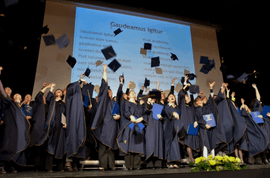European Academy of Sciences and Arts
The European Academy of Sciences and Arts (Latin: Academia Scientiarum et Artium Europaea) is a learned society of around 1,900[1] top scientists and artists who approach the questions facing Europe and the globe in various colloquia and publications. Among its members are 32 Nobel laureates.[2] Not focused on financial gain, the academy is funded by the European Union, Austria, public agencies and private sponsors, while remaining ideologically and politically independent.
| Formation | 1990 |
|---|---|
| Headquarters | Salzburg, Austria |
Membership | 1,900 |
President | Felix Unger |
| Website | euro-acad |
History
Founded in Salzburg, Austria, in 1990 by the heart surgeon Felix Unger of Salzburg, the cardinal archbishop of Vienna Franz Cardinal König and the political scientist and philosopher Nikolaus Lobkowicz.[3][4][5]
Development of Alma Mater Europaea
Since the early 2000s, the academy has been developing a university project called Alma Mater Europaea, sometimes with the subtitle of European University for Leadership.[6][7][8]

In 2010, the Alma Mater Europaea was officially established. The president of the university is prof. dr. Felix Unger, rector of the university is German political scientist prof. dr. Werner Weidenfeld, and prorector is Slovenian lawyer and diplomat prof. dr. Ludvik Toplak. In 2011, the university opened in Slovenia its first campus, the Alma Mater Europaea - Evropsko sredisce Maribor (ECM) (eng. Alma Mater Europaea – European Centre Maribor). In 2011 about 500 students were enrolled in the programmes of the Maribor campus. In July 2011, Alma Mater Europaea of the European Academy of Arts and Sciences also co-sponsored a Summer School in St. Gallen, Switzerland.[9] In 2012–2013 academic year, about 800 students were enrolled in Maribor. In 2013, the Salzburg campus of Alma Mater Europaea was founded. It is planned that about 1000 students will be enrolled in various studies in Austria, Slovenia, and other countries.
Declaration on climate change
In March 2007, the European Academy of Sciences and Arts issued a formal declaration in which they stated, "Human activity is most likely responsible for climate warming. Most of the climatic warming over the last 50 years is likely to have been caused by increased concentrations of greenhouse gases in the atmosphere. Documented long-term climate changes include changes in Arctic temperatures and ice, widespread changes in precipitation amounts, ocean salinity, wind patterns and extreme weather including droughts, heavy precipitation, heat waves and the intensity of tropical cyclones. The above development potentially has dramatic consequences for humankind's future,[10] and welcomed Live Earth and Save Our Selves initiatives, for beginning the process of mobilizing the people to take action on this matter.
Organisation and members
Members[11] are nominated by an existing elected member and nominees are evaluated by a subject committee and elected by the Senate of the Academy.[12] The members of the academy are organized in eight classes:[13]
- I. Humanities
- II. Medicine
- III. Arts
- IV. Natural Sciences
- V. Social Sciences, Law and Economics
- VI. Technical and Environmental Sciences
- VII. World Religions
- VIII. Corporate & Public Governance
See also
- European University Institute
- College of Europe
- Europa-Institut of Saarland University
References
- as of 2018
- http://www.euro-acad.eu/wp-content/uploads/2017/03/Nobel-Prize-Winners.pdf
- Felix Unger Archived 6 January 2013 at Archive.today → president and founding member
- Franz Cardinal König about the academy → history → founding member
- Nikolaus Lobkowicz Archived 11 December 2012 at Archive.today → honorary president and founding member
- Alma Mater Europaea der Europäischen Akademie der Wissenschaften und Künste
- EuroAcad → Organisation → Institutes → Alma Mater Europaea
- EuroAcad Archived 6 January 2013 at Archive.today → Search → Alma+Mater
- "Summer School Human Change Processes, St. Gallen, Switzerland" (PDF). Archived from the original (PDF) on 3 April 2012. Retrieved 27 October 2011.
- "European Academy of Sciences and Arts Let's Be Honest" (PDF).
- "Members | European Academy of Sciences and Arts". members.euro-acad.eu.
- "Nomination & Election | European Academy of Sciences and Arts". www.euro-acad.eu.
- http://www.euro-acad.eu → Membership → Classes